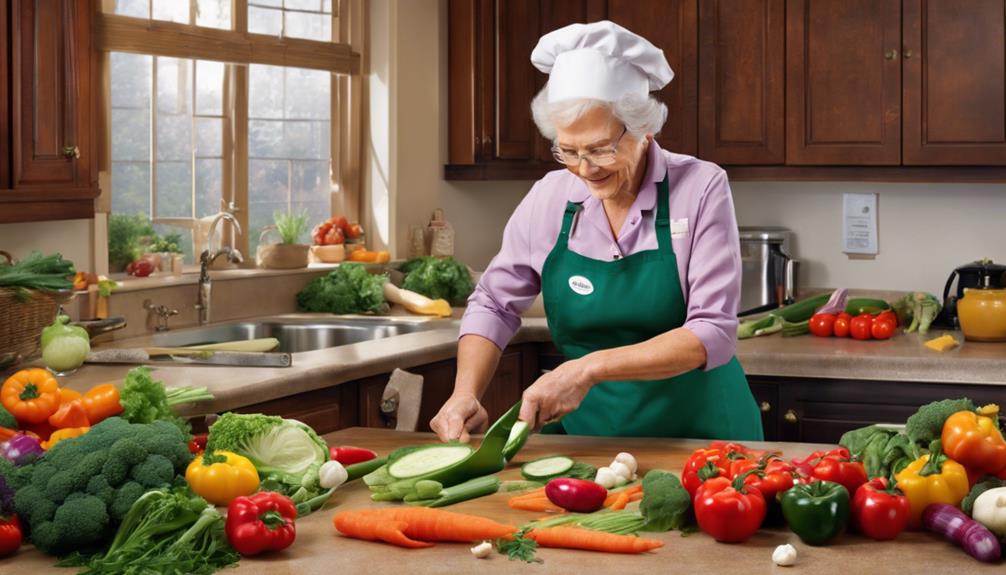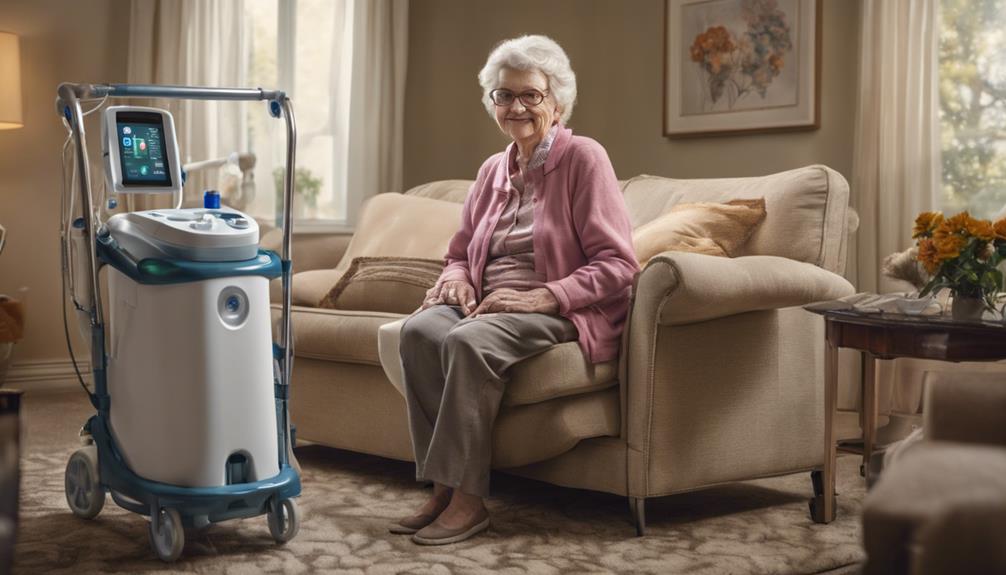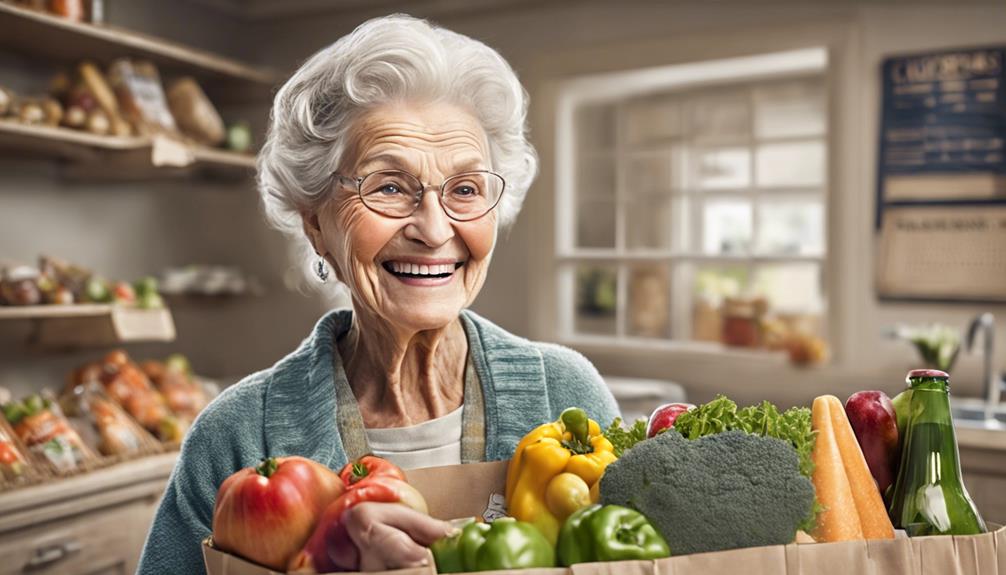To ensure aging gracefully in the comfort of your own home, it is important to remember the following tips: Utilize home health services to maintain a sense of familiarity and comfort. Prepare healthy meals that cater to specific dietary needs. Offer assistance with bathing using the necessary tools and emotional support. Keep track of medications with organized schedules and lists. Seek out specialized medical care when needed. Make safety enhancements in the home with handrails and lever handles. Choose a reputable caregiver agency that provides proper training and screening procedures. Ensure caregivers are knowledgeable about insurance coverage and share responsibilities effectively. Conduct thorough research on agencies for their credentials and services. Take advantage of community resources for additional support services and companionship. By following these guidelines, you can ensure a secure and dignified aging process. Translation: To ensure aging with dignity in the comfort of your own home, keep in mind these essential tips: Utilize home health services to maintain familiarity and comfort. Prepare nutritious meals tailored to dietary requirements. Provide bathing assistance with necessary tools and emotional support. Carefully manage medications with organized schedules and lists. Seek additional medical assistance for specialized care and monitoring. Make safety modifications in the home with handrails and lever handles. Select a reputable caregiver agency with proper training and screening procedures. Ensure caregivers understand insurance coverage and share responsibilities effectively. Thoroughly research agencies for credentials and services. Utilize community resources for support services and companionship. Remember, following these tips will help ensure a secure and dignified aging process.
Key Takeaways
- Ensure comfort and familiarity by receiving care at home.
- Provide assistance with meal planning and preparation.
- Offer bathing support with dignity and emotional comfort.
- Implement a detailed medication management plan.
- Consider home modifications for safety and autonomy.
Importance of Home Health Services
Home health services play an essential role in providing vital support and care for seniors aging in place. These services encompass a range of assistance, including meal preparation, bathing aid, and medication management. Additionally, visits from healthcare professionals like physical therapists and nurses make sure that seniors receive top-notch care tailored to their specific needs.
Home health services also extend to making necessary home modifications such as installing safety equipment like toilet adapters, shower chairs, and grab bars to enhance accessibility and prevent accidents. Furthermore, equipment such as wheelchairs and walkers may be provided to seniors to promote mobility and independence within their homes.
It's important to review insurance coverage to understand which home health services are covered and plan accordingly to address any care needs effectively. By utilizing these services, seniors can maintain their independence, safety, and well-being while aging gracefully in the comfort of their own homes.
Meal Preparation Assistance

When it comes to meal preparation assistance, we focus on menu planning tips and cooking techniques that cater to specific dietary requirements. These practices help guarantee that seniors receive the necessary nutrients for their age and health, promoting overall well-being.
Menu Planning Tips
When planning menus for in-home care, it's essential to consider dietary requirements and preferences to guarantee balanced nutrition and enjoyment. Make sure to plan meals in advance to establish a variety of nutrients and flavors.
Consider any dietary restrictions or preferences to customize the menu accordingly. Utilize fresh ingredients and whole foods for maximum health benefits, aiming to enhance overall well-being. Incorporate cultural or personal favorites into the menu to make mealtimes more enjoyable.
Remember to rotate menus regularly to prevent monotony and promote a diverse intake of nutrients. By following these menu planning tips, you can make sure that the meals provided aren't only nutritious but also satisfying for those under your care.
Cooking Techniques
To guarantee seniors receive nutritious and balanced meals, mastering cooking techniques for meal preparation assistance is essential. When assisting seniors with meal preparation, it's important to make sure that the food is not only delicious but also easy to consume. This can involve cutting, chopping, cooking, and portioning the meals accordingly. By incorporating deep breathing exercises while cooking, you can create a calm and focused environment, enhancing the overall dining experience for seniors. Below is a table outlining the key cooking techniques to take into account for meal preparation assistance:
| Cooking Techniques | Description |
|---|---|
| Cutting and Chopping | Make sure food is cut into manageable pieces |
| Cooking Methods | Use appropriate methods like baking, grilling, or steaming |
| Portion Control | Divide meals into suitable portions for easy consumption |
| Dietary Accommodations | Adjust recipes to accommodate dietary needs |
| Time Management | Plan and organize cooking tasks efficiently |
Bathing Support
When it comes to bathing support for seniors, it's essential to have the right equipment and assistance. Proper bathing equipment, like grab bars and non-slip mats, can greatly enhance safety in the bathroom.
Proper Bathing Equipment
Installing appropriate bathing equipment is crucial for guaranteeing the safety and independence of seniors in their daily hygiene routines. Dignity is maintained when seniors have access to grab bars, shower chairs, and non-slip mats in the bathroom. These tools prevent falls and accidents, allowing older adults to preserve privacy during personal hygiene tasks.
Adjustable handheld showerheads and bath benches offer comfort and convenience during bathing, promoting a sense of autonomy. Toilet adapters and bath lifts further enhance safety and efficiency in the bathing experience. By using bath transfer benches, seniors can move in and out of the tub with ease.
Providing these bathing support devices not only guarantees safety but also upholds the dignity of seniors as they engage in their daily routines.
Assistance With Bathing
Ensuring seniors receive proper bathing support is fundamental for maintaining their safety and independence in daily hygiene routines. Aging with dignity means offering assistance with tasks like getting in and out of the tub or shower safely, helping with washing hard-to-reach areas, and ensuring proper hygiene.
Caregivers play a vital role not only in physical support but also in providing emotional comfort during bathing, preserving the senior's dignity. Using specialized equipment such as grab bars and shower chairs can greatly enhance safety during bathing, reducing the risk of falls.
Medication Management Tips

To effectively manage medications at home, it's vital to create a detailed schedule with clear instructions for each medication. Using pill organizers or medication reminder apps can help track doses accurately. Additionally, keeping an updated list of medications, including names, dosages, and schedules, is essential for proper health care.
Communication is key; any changes in medication or side effects should be promptly reported to healthcare providers. Regularly reviewing medications with a healthcare professional guarantees their effectiveness and safety. By following these tips, we can make sure that medication management is done correctly and with care.
Additional Medical Support

As we focus on providing comprehensive in-home care, exploring additional medical support becomes essential. Home health aides play a pivotal role in providing assistance with daily activities, ensuring medication adherence, and offering essential companionship. Below is a table highlighting the key aspects of additional medical support in-home:
| Service | Description | Benefit |
|---|---|---|
| Medication Management | Oversight and support in taking medications as prescribed | Guarantees proper dosages and minimizes medication errors |
| Wound Care | Dressing changes, wound assessment, and infection prevention | Facilitates healing and prevents complications |
| Vital Signs Monitoring | Regular measurement of blood pressure, heart rate, and other essential signs | Early detection of health changes and interventions |
| Skilled Nursing Care | Specialized medical care such as post-surgery recovery, wound care, and injections | Ensures professional medical attention in-home |
| Physical Therapy | Rehabilitation exercises, mobility training, and pain management under the guidance of therapists | Improves strength, balance, and overall functional ability |
Home health aides work in collaboration with medical professionals to enhance the well-being and independence of individuals receiving in-home care.
Home Modifications for Safety

Enhancing safety through home modifications is vital for nurturing independence and minimizing risks for seniors. Simple changes like installing grab bars in the bathroom can greatly reduce the risk of falls. Adding non-slip mats in the shower or bathtub provides extra protection against slips and accidents during bathing.
Widening doorways and hallways for wheelchair accessibility not only improves mobility but also enhances independence within the home environment. Handrails on staircases offer stability and support for seniors experiencing balance issues. Lever-style door handles are a practical choice for individuals with limited hand strength or dexterity, as they're easier to operate than traditional knobs.
These home modifications are essential in creating a safe and comfortable living space for seniors, allowing them to navigate their homes with confidence and ease. By implementing these changes, we can help seniors maintain their autonomy and dignity while ensuring their safety and well-being.
Choosing the Right Caregiver Agency

Securing reliable in-home care begins with thoroughly vetting caregiver agencies for credibility and protection. When choosing the right caregiver agency for aging loved ones, it's important to take into account essential factors. Start by checking the agency's bonding, insurance, and licensing status to make sure they meet industry standards. Inquire about their employee screening process, including background checks and drug testing, to guarantee the safety of your loved one. Additionally, assess the agency's training requirements for caregivers; this ensures they're equipped to provide quality care tailored to aging individuals' needs.
Matching the services offered by the agency with your specific requirements is crucial to creating a all-encompassing care plan. Also, asking about the agency's supervision and quality control measures ensures consistent and reliable care. By taking these steps, you can select a caregiver agency that provides the right support for aging individuals, promoting their well-being and dignity at home.
Coping Strategies for Caregivers

To effectively navigate the challenges of caregiving, clarifying insurance coverage and maintaining open communication with loved ones are essential strategies for caregivers. Understanding what expenses are covered and asking the right questions about insurance can guarantee that all caregiving needs are met without unexpected financial burdens.
Communicating openly with family members and loved ones not only fosters supportive relationships but also helps in sharing the caregiving responsibilities, preventing burnout, and ensuring tasks are distributed effectively. Additionally, prioritizing self-care and engaging in personal activities is vital for maintaining mental and physical well-being while caring for others.
Seeking support from caregiver groups can provide a morale boost, shared experiences, and practical advice on coping strategies, helping caregivers age with dignity.
- Clarify insurance coverage through inquiries to ensure understanding of caregiving expenses.
- Communicate care and concern to maintain open and supportive relationships during caregiving.
- Share responsibilities with family members to prevent burnout and distribute tasks effectively.
Researching Caregiver Agencies

When researching caregiver agencies, it's important to confirm their credentials to guarantee the safety and quality of care provided to your loved ones. To make aging a dignified process, start by verifying if the agency is bonded, insured, and licensed.
Inquire about their employee screening procedures, including background checks and drug testing, to safeguard your loved ones' safety. Additionally, ask about the training and education requirements for employees to make sure they're equipped to provide quality care.
Consider the services offered by the agency and see if they align with the specific needs of your loved ones. It's also vital to inquire about the supervision and quality control measures in place at the agency to ensure the consistency and effectiveness of care provided.
Utilizing Community Resources

When seeking support for in-home care, we can tap into community resources that offer valuable assistance.
These resources include:
- Community support networks
- Accessible services locators
- Volunteer assistance programs
Community Support Networks
In harnessing the power of community support networks, seniors can access a wide array of essential resources to help them age in place with dignity. Community support networks offer services like meal delivery, transportation, and home maintenance assistance. These networks, which include local organizations, senior centers, faith-based groups, and volunteer programs, are dedicated to supporting aging individuals in their homes.
Accessible Services Locator
Utilizing the Accessible Services Locator streamlines the process of finding in-home care services for individuals seeking assistance in their local area. This tool provides valuable information on home health agencies and caregivers available for in-home assistance, making it easier to connect with reliable caregiver services for aging at home.
Users can access the locator online or through community resources like the NVCC website, ensuring convenient access to essential care services. Recommendations from the Council on Aging and word-of-mouth referrals can also be beneficial in utilizing community resources effectively.
Volunteer Assistance Programs
Volunteer assistance programs offer invaluable support for seniors by aiding with daily tasks, providing companionship, and guaranteeing a sense of community. These programs are essential for seniors looking to maintain their independence and quality of life while aging in place.
Here are three key aspects of volunteer assistance programs:
- Support with Daily Tasks: Volunteers help with grocery shopping, transportation, and light housekeeping, easing the burden on seniors.
- Companionship and Social Interaction: Volunteers offer companionship, reducing feelings of isolation and loneliness that many seniors experience.
- Safe and Reliable Assistance: Volunteers undergo training to make certain they can provide secure and dependable help to seniors, making the seniors feel comfortable and well-cared for.
Frequently Asked Questions
How Do You Take Care of an Old Person at Home?
We guarantee elders' well-being at home by creating a safe environment, overseeing medication and routines, encouraging physical and mental activities, staying updated about their health, and seeking professional help when necessary to prevent exhaustion and prioritize their care.
What Happens if Elderly Person Has No One to Care for Them?
When an elderly person has no one to care for them, they may struggle with daily tasks, face social isolation, and have difficulty accessing healthcare. Without support, seniors are at risk of accidents and delays in seeking help for health issues.
What Is the Most Requested Support Service for Elderly?
In-home caregiving is the most requested support service for the elderly. We provide personalized attention, comfort, and assistance with daily activities. It allows seniors to age in a familiar environment while maintaining independence and dignity.
What Is It Called When You Take Care of Elderly at Home?
Caring for the elderly at home is known as in-home care. It involves personalized assistance like medication management and companionship. Families choose this option to help seniors maintain independence and quality of life in a familiar environment.
How Can I Ensure In-Home Care Services Maintain Dignity for Aging Loved Ones Using Different Payment Options?
When seeking in-home care services for aging loved ones, it’s important to consider the differences between Medicaid and Medicare. Understanding these options can help ensure that your loved ones receive the care they need while maintaining their dignity. Making informed decisions about payment options can make a significant impact on the quality of care provided.
Conclusion
To sum up, when it comes to in-home care for aging loved ones, it's crucial to prioritize their dignity and well-being. Keep in mind the old saying, 'Aging isn't lost youth but a new stage of opportunity and strength.'
By following the essential tips outlined in this article, you can guarantee that your loved one receives the best possible care while maintaining their independence and quality of life. Don't hesitate to seek help from caregiver agencies and community resources to provide the support needed for aging with dignity.









